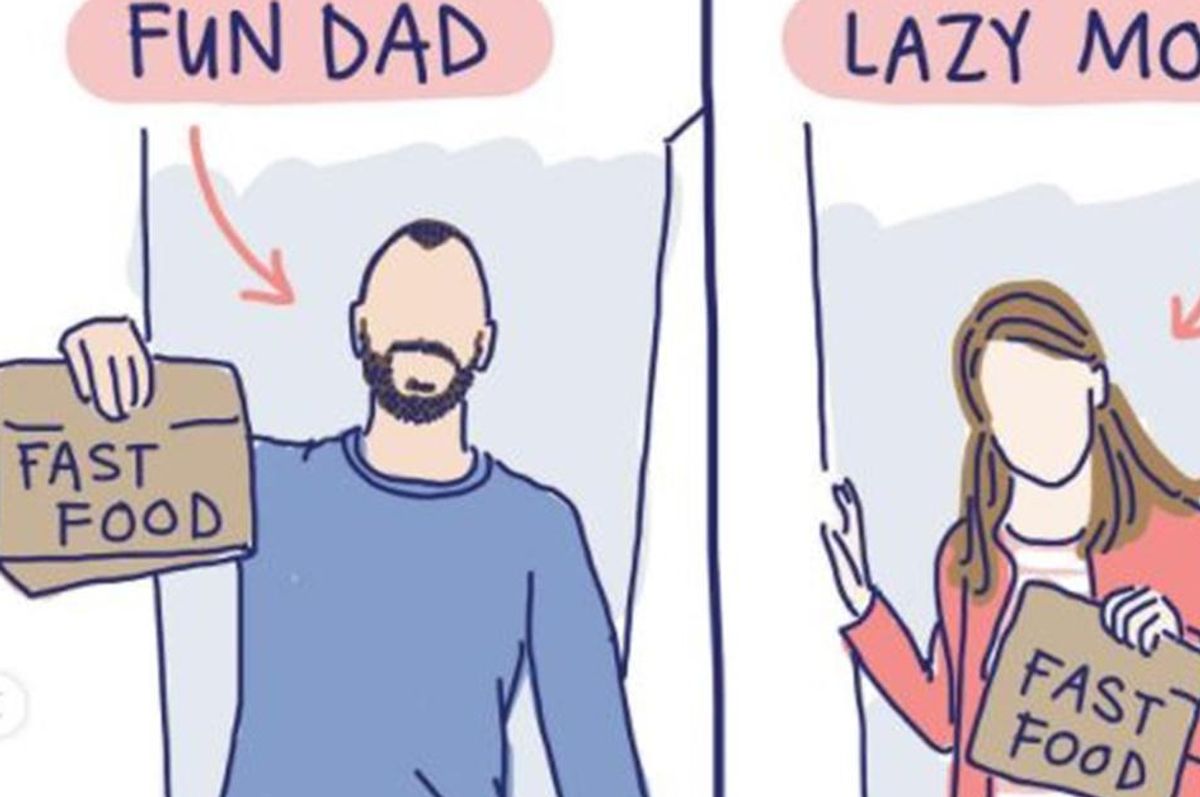Mom's comics perfectly illustrate the double standard of how society treats mothers and fathers
Why are expectations for mothers and fathers so different?

"Fun" dad versus "lazy" mom.
Last November, Upworthy published a popular story about Chloe Sexton, a mother who went viral on TikTok for a video she made explaining “daddy privilege” or the idea that fathers are applauded for doing things that mothers are supposed to do. "In my opinion, 'daddy privilege' is that subtle upper hand men sidestep into as parents that allows them to gain praise for simply…being a parent," she said. "
You fed the baby? What a great dad! You held the baby while mommy bathed? So considerate of you! You picked up something for dinner? What would your family do without you?! It's all the little ways mothers do exactly what the world expects of them without a second thought and then watch fathers get praised for simply showing up."
Sadly, the post resonated with a lot of mothers, because it's true. Expectations for fathers are so low that men are commended for handling basic parenting tasks. But if a mother falls short of perfection, she faces harsh criticism.
Mary Catherine Starr, a mother living in Cape Cod who owns a design studio and teaches yoga, is getting a lot of love on Instagram for her cartoon series that perfectly explains daddy privilege.
In "An Illustrated Guide to the Double Standards of Parenting," Starr shares this concept by showing that when a man comes home with fast food for his kids he's the "fun dad." But if a mom comes back with a bag from McDonald's she is seen as a "lazy mom."
In the comics, the same double standards apply whether it's how they handle technology or parent at the park.
(Note: Click the arrow on the right-hand side of the image to see the slideshow.)
Starr was quick to point out in the comments that the target of her comics isn’t fathers, but society at large. “This is not a dig at dads, it's a dig at our society—a society that applauds dads for handling the most basic of parenting duties + expects nothing short of perfection from mothers (or even worse, shames them for every decision and/or move they make!),” she wrote.
The comics resonated with a lot of women.
"This hit a nerve with so many women! I was a single mom living in an apartment,” an Instagram user named Saturdayfarm wrote in the comments. “Next door - a single dad. Neighbors felt so bad for him that they helped him with his laundry, brought over food, and babysat. For nothing. I just shakily carried on somehow. And I had so much less money and opportunities.”
"This is exactly part of the why I feel like being ‘just’ a mom isn’t as valuable. Being so run of the mill. But if my husband has the baby in a sling, the toddler in the pram and is out walking the dog, he’s superman for letting me have one hour for zoom work," rebecca_lee-close_yoga wrote.
A father who understands his privilege completely supports Starr’s message.
"It actually annoys me when I get those types of comments / ‘compliments’ knowing it’s totally a double standard," JonaJooey wrote.
Starr’s comics and Sexton’s TikTok videos won't stop the double standards when it comes to parenting, but they do a great job at holding a mirror up to the problem. Where do we go from here? We can start by having greater expectations for fathers and holding them up to a higher standard. Then, we should take the energy we put into praising dads for doing the bare minimum and heap it on mothers who thanklessly go about the most important job in the world.
This story originally appeared two years ago.

